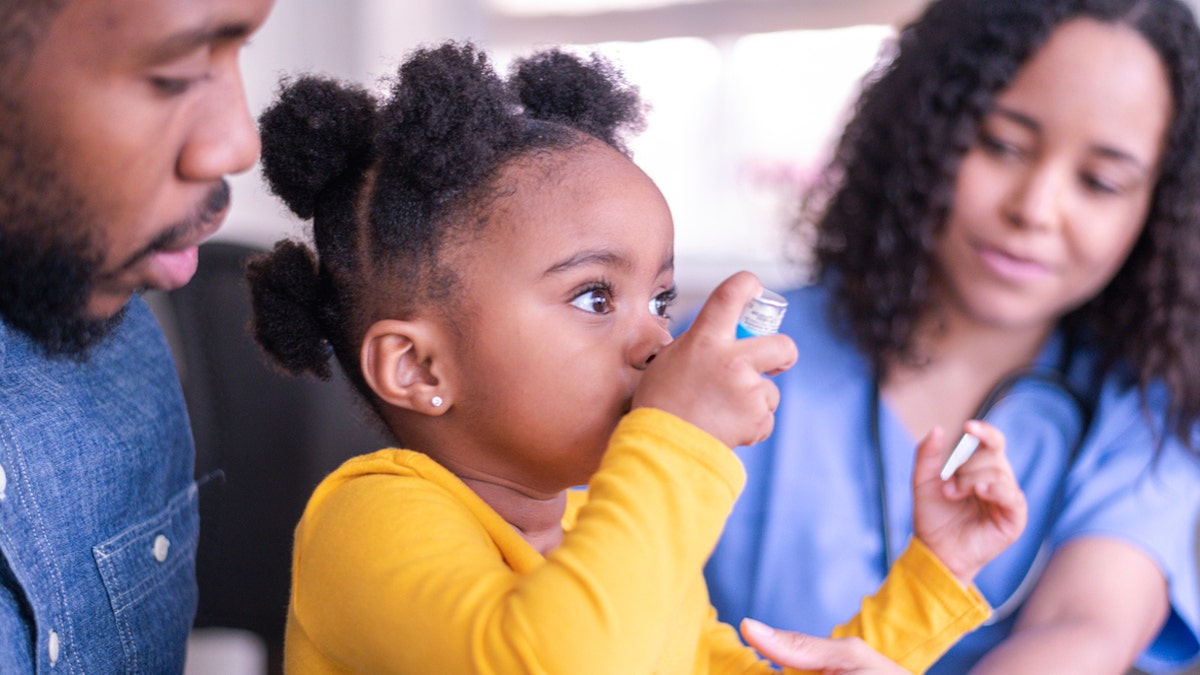Bacteria-containing dust found at day care centers could put children at a higher risk of asthma, a new study from the European Respiratory Society suggests.
In the study, the researchers collected dust samples from 103 different day care facilities in Paris, France.
Then they analyzed the samples in a lab to identify the bacteria found in each one.
The researchers also asked the parents of 515 children to disclose whether the children experienced any wheezing or other respiratory issues.
ASTHMA AND ECZEMA COULD INCREASE RISK OF OSTEOARTHRITIS, STUDY FINDS
Of the four types of bacteria found, one of them — which included Streptococcus and Lactococcus — was linked to a higher risk of wheezing.
That’s often a precursor to asthma in children under 3 years old, the journal entry noted.
Bacteria-containing dust found at day care centers could put children at a higher risk of asthma, a study from the European Respiratory Society suggests. (iStock)
The average age of the children in the tested day care centers was 2 years old.
The findings were presented at the European Respiratory Society International Congress in Milan, Italy, by Dr. Annabelle Bédard, a researcher at Inserm (the French National Institute of Health and Medical Research) in Paris, France.
STUFFY NOSE? COMMON OTC NASAL DECONGESTANTS WITH PHENYLEPHRINE DON’T WORK IN TABLET FORM, EXPERTS SAY
“We find mixtures of different bacteria and other microbes living everywhere — outside, inside our homes, on our skin and even inside our bodies,” Bédard said in her presentation. “These communities of bacteria, known as microbiota, can have beneficial or harmful effects on our health.”
She added, “Young children will come into contact with the bacteria living in day care centers via their skin and mouths and by breathing them in. So, we might expect this exposure to have an impact on children’s developing lungs via the different microbiota that arise in children’s airway, gut or skin.”

Of the four types of bacteria found, one of them — which included Streptococcus and Lactococcus — was linked to a higher risk of wheezing, which is often a precursor to asthma in children under 3 years old. (iStock)
These findings highlight the need to further investigate indoor air quality at day care centers, Bédard said.
“We now need to understand what factors influence this bacterial community — for example, how the rooms are cleaned and ventilated, and indoor air quality,” she said.
“This, along with future findings from other studies, could help us understand how to improve conditions and inform public health strategies for preventing chronic respiratory diseases, such as asthma, in children.”
COVID-19, FLU AND RSV VACCINES ARE ALL AVAILABLE THIS FALL: SEE WHAT SOME DOCTORS RECOMMEND AND WHY
The researchers plan to follow the health of the children in the study to determine which develop asthma as they grow older.
Dr. Steven Abelowitz, founder and medical director of Coastal Kids Pediatrics in California and also medical director of Pediatric Associates, was not involved in the study but reviewed the findings.
He noted that some of the bacteria found in the study are quite common, while others are less common.
“We still have a great deal to learn about these complex bacteria types and how our bodies respond to them.”
“Per the study, at least two of the types of bacteria (Streptococcus and Lactococcus) — which were the second most common bacteria they found — showed an association of a higher risk of wheezing in the study,” Abelowitz told Fox News Digital.
“We still have a great deal to learn about these complex bacteria types and how our bodies respond to them.”
CLICK HERE TO SIGN UP FOR OUR HEALTH NEWSLETTER
While wheezing can be a sign or symptom of asthma, the doctor noted that’s not always the case.
“It really depends on how frequent and severe the wheezing is, as well as if there is a family history of allergies, asthma and eczema,” he said. “Some studies have even shown that day care attendance in early childhood has been observed to be inversely associated with wheezing and asthma.”

To minimize the risk of wheezing and other lung issues in kids attending day care facilities, a California doctor recommends that all rooms be kept clean and well-ventilated, and that indoor air quality is consistently monitored. (iStock)
To minimize the risk of wheezing and other lung issues in kids who are attending day care facilities, Abelowitz recommended that all rooms be kept clean and well-ventilated, and that indoor air quality is consistently monitored.
CLICK HERE TO GET THE FOX NEWS APP
Abelowitz reiterated the need for more studies to explore these “complex communities of bacteria” and their potential association with long-term lung issues for children.
He added, “From a pediatrician’s standpoint, it’s more important to choose childcare programs with low child-to-teacher ratios, small group sizes, well-trained staff, age-appropriate curriculum and a safe, positive environment.”
For more Health articles, visit www.foxnews/health
